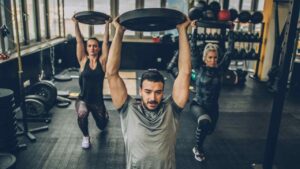Top Essential Nutrients For Women From 20-40: In today’s fast-paced world, women in their 20s and 30s often juggle various responsibilities, including work, studies, and personal life. Amidst these demands, maintaining good health becomes a priority, and nutrition plays a crucial role in achieving it. A well-balanced diet, rich in essential nutrients, not only supports daily energy levels but also promotes long-term wellness. From maintaining strong bones to ensuring hormonal balance, the right nutrients are key to optimizing health during these important years.
This guide highlights the significance of key vitamins, minerals, and other nutrients that are vital for women’s health in their 20s and 30s. By focusing on foods that are rich in these essential nutrients, women can enhance their overall well-being, improve energy levels, and reduce the risk of chronic health issues in the future.
1. Importance of Protein for Women’s Health in Their 20s and 30s
Protein is an essential nutrient for women, especially in their 20s and 30s, as it helps in maintaining muscle mass, skin, and hair health. In this stage of life, women are often busy balancing work, studies, and personal life, which makes proper nutrition more important than ever. Protein helps in repairing body tissues and plays a key role in the production of enzymes and hormones.
As women age, their muscle mass tends to decrease, which can affect overall strength and metabolism. Consuming enough protein can help prevent muscle loss and support metabolic health. Good sources of protein include lentils, beans, chicken, fish, eggs, and dairy products. Including protein-rich foods in each meal also helps keep hunger at bay and promotes better weight management.
2. Key Vitamins for Bone Health: Calcium and Vitamin D
Calcium and vitamin D are crucial for strong and healthy bones. In the 20s and 30s, women may not always focus on bone health, but it’s important to build a strong foundation before reaching menopause. Calcium strengthens bones and teeth, while vitamin D helps the body absorb calcium. Without enough vitamin D, calcium cannot be effectively used, leading to weakened bones over time. Dairy products like milk, yogurt, and cheese, as well as green leafy vegetables like spinach and kale, are excellent sources of calcium. For vitamin D, exposure to sunlight and foods like eggs, fortified cereals, and fish are beneficial. Ensuring an adequate intake of both can help reduce the risk of fractures and osteoporosis later in life.
3. Iron: A Vital Nutrient to Prevent Anemia in Women
Iron is an essential nutrient that plays a key role in the production of hemoglobin, which helps red blood cells carry oxygen throughout the body. Women in their 20s and 30s, especially those who menstruate, are at a higher risk of iron deficiency due to blood loss during periods. Low iron levels can lead to anemia, causing symptoms like fatigue, weakness, and dizziness. Good sources of iron include spinach, lentils, chickpeas, and meat, especially red meat. To enhance iron absorption, it’s helpful to combine iron-rich foods with vitamin C-rich foods like oranges, tomatoes, and bell peppers.
4. Essential Omega-3 Fatty Acids for Hormonal Balance
Omega-3 fatty acids are healthy fats that play a significant role in maintaining hormonal balance. These fatty acids support the production of hormones, including estrogen and progesterone, which are important for menstrual health and fertility. Omega-3s also have anti-inflammatory properties and can help reduce the symptoms of conditions like polycystic ovary syndrome (PCOS).
Women in their 20s and 30s who consume omega-3s regularly experience better mood regulation and less risk of developing chronic conditions like heart disease. Rich sources of omega-3 include fatty fish like salmon and mackerel, walnuts, chia seeds, and flaxseeds.
5. Folate and Its Role in Reproductive Health for Women
Folate, also known as vitamin B9, is crucial for women’s reproductive health, especially during their 20s and 30s. This vitamin helps prevent birth defects and supports healthy cell division. If you plan on having children, it is important to get enough folate even before pregnancy, as it helps prevent neural tube defects in the developing baby. Folate is also involved in red blood cell production and helps maintain energy levels. Foods rich in folate include leafy greens like spinach, legumes, citrus fruits, and fortified cereals. Taking a folic acid supplement is recommended for women planning to conceive.
6. Magnesium: Supporting Energy Levels and Reducing Stress

Magnesium is an essential mineral that plays a key role in over 300 biochemical reactions in the body, including energy production and nerve function. Women in their 20s and 30s often experience stress due to work and personal commitments, and magnesium helps reduce the physical effects of stress by promoting relaxation. It also supports healthy sleep patterns and muscle function. Foods like almonds, cashews, spinach, and dark chocolate are rich in magnesium. Adding magnesium-rich foods to your diet can help improve energy levels, reduce anxiety, and prevent muscle cramps.
7. Antioxidants: Protecting Skin and Fighting Aging
Antioxidants are compounds that protect the body from the harmful effects of free radicals, which can lead to skin aging and various chronic diseases. In your 20s and 30s, it’s crucial to protect your skin from damage caused by UV rays, pollution, and stress. Antioxidants help fight these effects and maintain a youthful appearance. Vitamin C, vitamin E, and beta-carotene are powerful antioxidants that support skin health by boosting collagen production and reducing wrinkles. Bright-colored fruits and vegetables like berries, oranges, carrots, and tomatoes are excellent sources of antioxidants. Regular consumption of these foods can help keep your skin glowing and youthful.
8. Hydration: The Importance of Water and Electrolytes
Staying hydrated is vital for maintaining optimal health. Water plays a key role in digestion, nutrient absorption, and detoxification. It also helps maintain body temperature and supports healthy skin. Women in their 20s and 30s may have busy lifestyles that can sometimes lead to dehydration, which can cause fatigue, headaches, and dry skin. It’s important to drink enough water throughout the day and replenish electrolytes lost during exercise or hot weather. Electrolytes like sodium, potassium, and magnesium help maintain the body’s fluid balance. Coconut water, bananas, and yogurt are good sources of electrolytes.
9. Fiber for Digestive Health and Weight Management
Fiber is an essential nutrient that supports digestive health by promoting regular bowel movements and preventing constipation. It also helps control blood sugar levels and supports heart health. Women in their 20s and 30s should aim to include fiber-rich foods in their diet to maintain a healthy digestive system and manage weight. Fiber helps you feel full for longer, reducing overeating. Good sources of fiber include whole grains, fruits, vegetables, beans, and legumes. Adding these foods to meals not only aids digestion but also helps maintain a healthy weight.
10. Zinc: A Crucial Mineral for Immune Function and Skin Health
Zinc is an important mineral that supports immune function and plays a vital role in wound healing. It also supports skin health by reducing acne and promoting collagen production. Zinc helps protect the skin from the harmful effects of UV rays and supports the body’s ability to repair and regenerate skin cells. Women in their 20s and 30s who get enough zinc in their diet are less likely to experience skin issues like acne and eczema. Zinc-rich foods include nuts, seeds, seafood, dairy products, and whole grains. Adding these to your diet can help maintain a strong immune system and clear, healthy skin.
Frequently Asked Questions (Top Essential Nutrients For Women From 20-40)
1. Why are essential nutrients important for women in their 20s to 40s?
Essential nutrients play a crucial role in maintaining overall health, energy levels, and managing the physical changes that occur during these decades. They support bone health, hormonal balance, reproductive health, immune function, and skin vitality, which are important as women navigate different stages of life.
2. How much protein should women consume daily?
The recommended daily intake of protein varies based on factors like activity level, age, and health goals. On average, women should aim for around 46–56 grams of protein per day. Active women or those looking to build muscle may require more protein to support recovery and strength.
3. What are the best sources of calcium and vitamin D for women in their 20s and 30s?
Calcium-rich foods include dairy products like milk, cheese, and yogurt, as well as leafy greens, almonds, and fortified plant-based milk. Vitamin D can be obtained through sunlight exposure and foods such as fortified milk, eggs, fatty fish (like salmon), and mushrooms. A combination of both nutrients is essential for optimal bone health.
4. How can I prevent iron deficiency or anemia?
Iron deficiency is common in women due to menstrual blood loss. To prevent anemia, include iron-rich foods such as lentils, spinach, red meat, and beans in your diet. Pairing these foods with vitamin C-rich foods like oranges or tomatoes can enhance iron absorption.
5. What are some good sources of omega-3 fatty acids?
Omega-3 fatty acids are found in fatty fish like salmon, mackerel, and sardines, as well as in plant-based sources such as chia seeds, flaxseeds, and walnuts. These fats are vital for brain function, hormonal balance, and heart health.
6. How can I get enough folate if I’m not pregnant?
Folate is important for cell division and energy production. Even if you’re not planning to get pregnant, folate helps maintain healthy red blood cells. Foods rich in folate include leafy greens, beans, lentils, citrus fruits, and fortified cereals.
7. How much water should I drink each day?
It’s recommended to drink at least 8-10 cups (2-2.5 liters) of water daily, but your needs may vary depending on physical activity levels, climate, and individual health. Staying hydrated is key to supporting digestion, skin health, and overall energy.
8. Can magnesium help with stress and sleep problems?
Yes, magnesium has been shown to help reduce stress, promote relaxation, and improve sleep quality. Foods like nuts, seeds, spinach, and whole grains are great sources of magnesium. You can also consider taking magnesium supplements if needed, after consulting with a healthcare provider.
9. How do antioxidants protect the skin and reduce aging signs?
Antioxidants neutralize harmful free radicals that cause oxidative stress, which can lead to skin aging, wrinkles, and pigmentation. Including foods like berries, dark chocolate, spinach, and citrus fruits in your diet can help protect the skin and maintain its youthful appearance.
10. What is the role of zinc in immune function and skin health?
Zinc is vital for immune function, helping the body fight infections. It also supports skin health by reducing acne and promoting wound healing. Foods like nuts, seeds, seafood, and whole grains are great sources of zinc to include in your daily diet.




